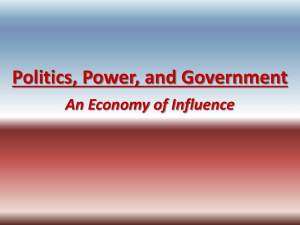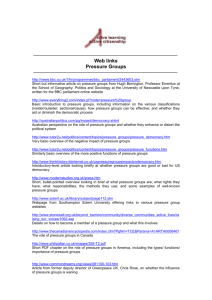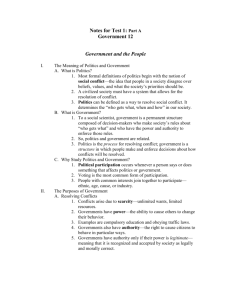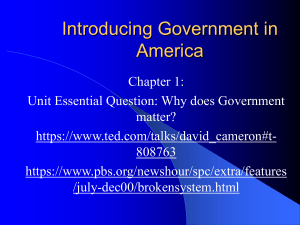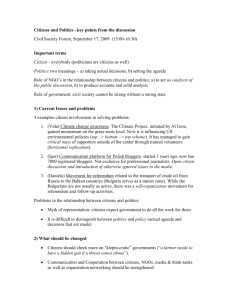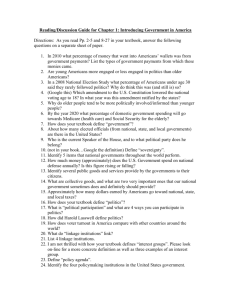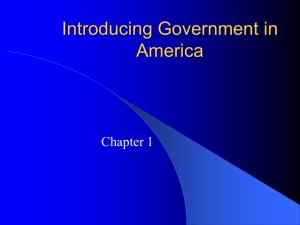Unit 1: Principles of Government and Political Systems GLE # GLE
advertisement
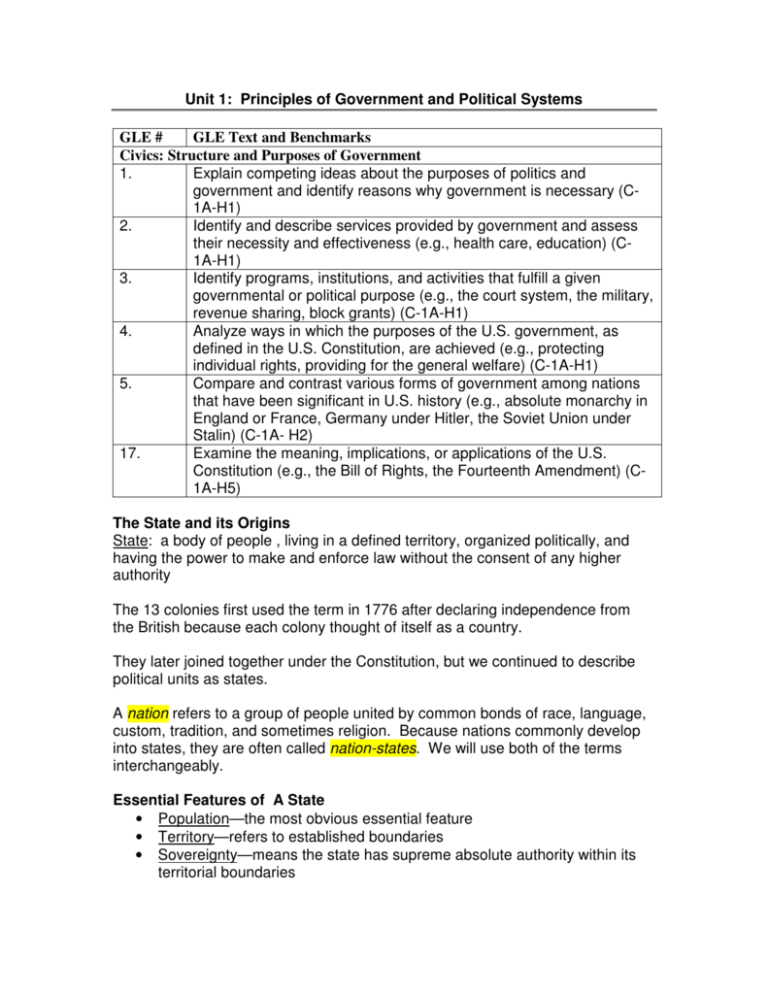
Unit 1: Principles of Government and Political Systems GLE # GLE Text and Benchmarks Civics: Structure and Purposes of Government 1. Explain competing ideas about the purposes of politics and government and identify reasons why government is necessary (C1A-H1) 2. Identify and describe services provided by government and assess their necessity and effectiveness (e.g., health care, education) (C1A-H1) 3. Identify programs, institutions, and activities that fulfill a given governmental or political purpose (e.g., the court system, the military, revenue sharing, block grants) (C-1A-H1) 4. Analyze ways in which the purposes of the U.S. government, as defined in the U.S. Constitution, are achieved (e.g., protecting individual rights, providing for the general welfare) (C-1A-H1) 5. Compare and contrast various forms of government among nations that have been significant in U.S. history (e.g., absolute monarchy in England or France, Germany under Hitler, the Soviet Union under Stalin) (C-1A- H2) 17. Examine the meaning, implications, or applications of the U.S. Constitution (e.g., the Bill of Rights, the Fourteenth Amendment) (C1A-H5) The State and its Origins State: a body of people , living in a defined territory, organized politically, and having the power to make and enforce law without the consent of any higher authority The 13 colonies first used the term in 1776 after declaring independence from the British because each colony thought of itself as a country. They later joined together under the Constitution, but we continued to describe political units as states. A nation refers to a group of people united by common bonds of race, language, custom, tradition, and sometimes religion. Because nations commonly develop into states, they are often called nation-states. We will use both of the terms interchangeably. Essential Features of A State • Population—the most obvious essential feature • Territory—refers to established boundaries • Sovereignty—means the state has supreme absolute authority within its territorial boundaries • Government—the body through which the state maintains social order provides public services, and enforces decisions that all people in the state must follow Theories of the Origins of the State • Evolutionary Theory—states evolved over time from the family. As the family grew and became extended, it needed more organization • Force Theory—government emerged when people of an area were brought under control of a person or group • Divine Right Theory—ancient civilizations believed that gods chose leaders. By the mid-1600s, European monarchs claimed they were appointed by God to rule: “the divine right of kings” • Social Contract Theory—Thomas Hobbes in England was one of the first to theorize how the social contract came about. According to this theory, people surrendered to the state the power needed to maintain order. The state, in turn, agreed to protect its citizens. John Locke wrote that people are naturally endowed with the right to life, liberty, and property. To preserve these rights, they willingly gave power to a governing authority. When the government failed to preserve the rights of the people, the people could justly break the contract. Hobbes did not believe people had this right. Parliament justified the overthrow of King James II with William and Mary (Glorious Revolution) in 1688. The colonists also used the as justification in issuing the Declaration of Independence. Activity 1: Using Primary Sources to Define the Purposes of Government (click here) The Purposes of Government • To maintain social order • To provide public services • To provide for national security and a common defense • To provide for and control the economic system The government makes decisions that are authoritative: enforced on all of society. Government gets authority from two sources—(1) their legitimacy and (2) their ability to use coercive force. Activity 3: The Need for Government (click here) Types of Government • Autocracy—the power to govern is in the hands of one person. This is the oldest and most common type. Usually through inheritance or military/ police power does the ruler assume power. One type of autocracy is a dictatorship (ie. Hitler, Mussolini, Stalin, Hussein). Another type is a monarchy where a king, queen, or emperor is in control. Absolute monarchies are rare but may be found in Saudi Arabia. Constitutional 2 • • monarchies exist when the monarch shares governing power with elected legislatures or is ceremonial. Oligarchy—a small group holds power. Communist China is an example where the Communist Party and armed forces control government. Democracy—rule is by the people. This idea comes from ancient Greece. People have sovereign power. Abraham Lincoln described it as “a government of the people, by the people, and for the people.” In a direct democracy, people govern by voting on issues individually. These may be found in some New England town meetings and some cantons of Switzerland; no country has one due to population. In a representative democracy, people elect representatives and give them the responsibility and power to make laws and conduct government. The government of the United States may be described as a representative democracy. These governments may be called councils, legislatures, congress, or parliament to name a few. Characteristics of Democracy 1) Individual liberty 2) Majority rule with minority rights 3) Free elections 4) Competing political parties Activity 5: Classifying Forms of Government Government Systems • Unitary Systems gives all key powers to the national government. There is limited sovereignty to local governments. Ex. Great Britain, Italy, France • Federal Systems divide the power of government between the national government and state or provincial governments. Ex. The United States, Canada, Switzerland, Mexico, Australia, and India Politics and Government Politics is the effort to control or influence the conduct and policies of government. There is a continual struggle over what benefits and services governments should provide, now much they should cost, and who should pay for them. Through politics, individuals and groups seek to maximize the benefits they get from government while they try to reduce the costs of these benefits. Importance of politics: Through politics, conflicts in society are managed. As people seek rewards and benefits, politics provides a peaceful way for them to compete with one another. Special Interests: The Constitution says that government should promote the general welfare. The Framers were cautious to operate in best interest of all the people and be cautious of factions (special groups of citizens with a common interest). Activity 6: Comparing Political Systems 3 4

